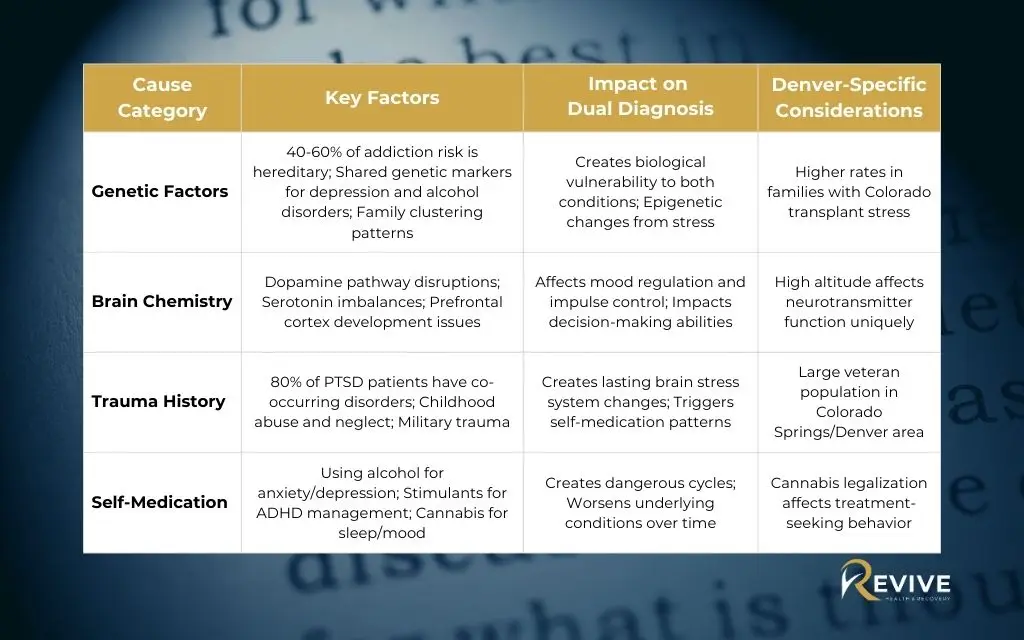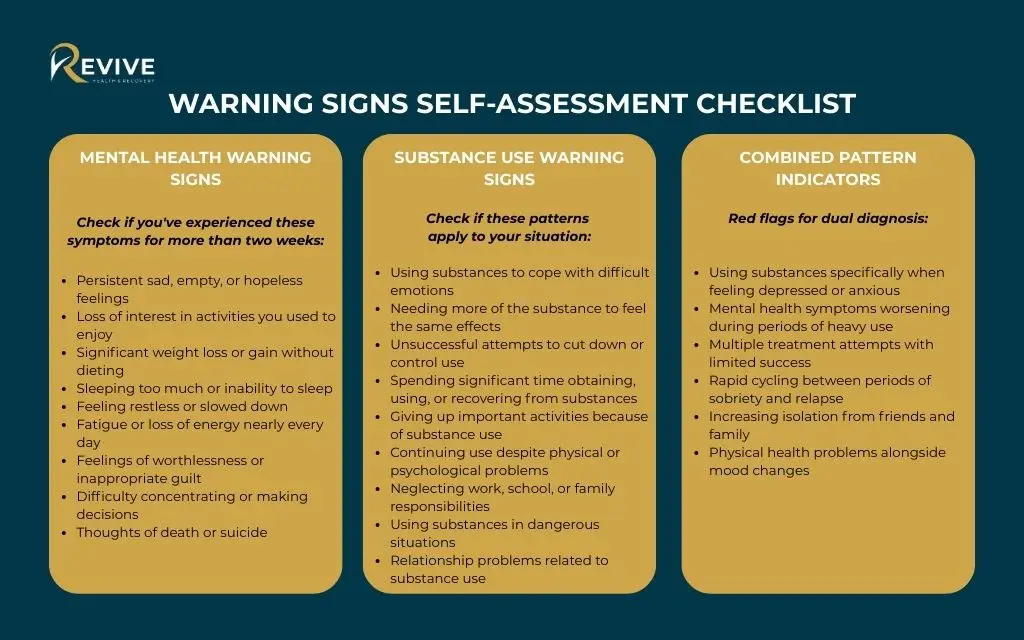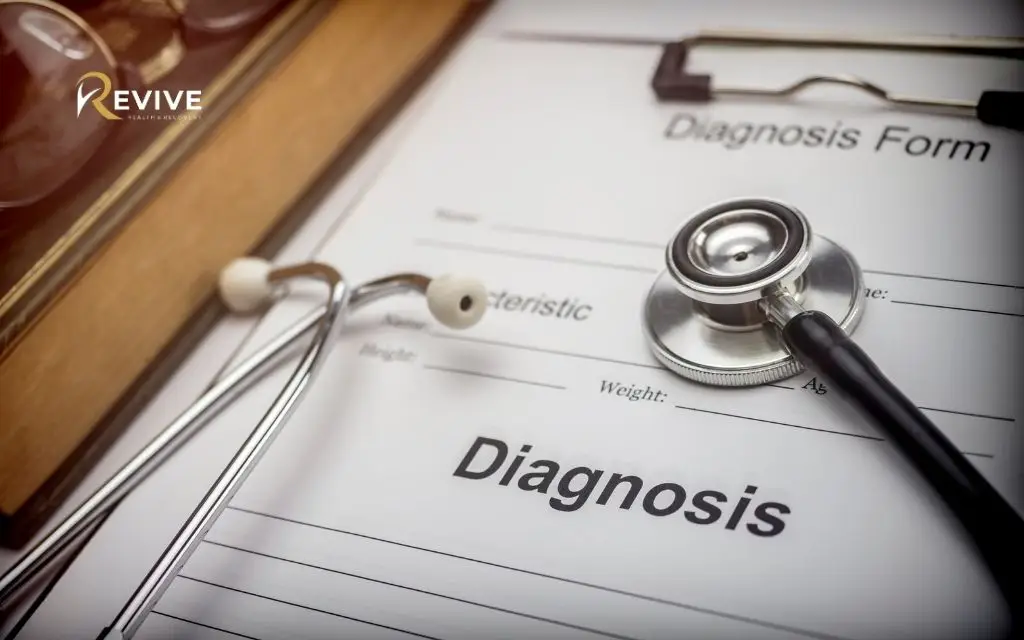Have you ever wondered why some people develop both mental health disorders and substance use problems at the same time? The causes of dual diagnosis are more complex than most people realize, yet understanding them is crucial for effective recovery.
Dual diagnosis refers to the simultaneous occurrence of mental health disorders and substance use issues. In the Denver-Aurora metropolitan area, 11.9% of residents struggle with substance use disorders, often alongside conditions like depression, anxiety, or PTSD. This rate exceeds the national average, making it essential to understand why this double diagnosis situation develops in our community.
Multiple interconnected factors contribute to dual diagnosis, including genetic predisposition, environmental stressors, trauma history, and neurobiological changes. Denver’s unique characteristics create specific risk and protective factors that influence how these conditions manifest locally.
By understanding these root causes, you and your family can better recognize early warning signs and seek appropriate integrated treatment. This knowledge empowers you to take control of your recovery journey and find lasting wellness.
Understanding dual diagnosis fundamentals
Medical definition and clinical recognition
The term “dual diagnosis” emerged in the 1980s when clinicians first recognized severe mental illness occurring alongside substance abuse. This evolution from “mentally ill chemical abusers” to current terminology reflects our growing understanding of these interconnected conditions.
The DSM-5 provides specific diagnostic criteria that help mental health professionals identify co-occurring disorders accurately. These assessment methods ensure comprehensive evaluation of both mental health symptoms and substance use patterns.
Statistics reveal the scope of this challenge. Approximately 53% of drug users also experience mental illness, while 37% of alcohol users have co-occurring mental health conditions. These numbers highlight why integrated treatment approaches are essential for lasting recovery.

Why simultaneous treatment matters
Traditional treatment models that address only one condition often fail because symptoms amplify between disorders. When depression goes untreated, alcohol use increases. When substance use continues, anxiety symptoms worsen.
Single-condition treatment leads to higher relapse rates because the underlying causes remain unaddressed. Patients frequently cycle through multiple treatment episodes without achieving stability.
Integrated care models prove most effective because they address both conditions simultaneously. This approach recognizes that mental health and substance use disorders share common root causes and require coordinated treatment strategies.
Primary causes of dual diagnosis
Understanding the main causes of dual diagnosis helps identify risk factors and prevention strategies. Here’s a comprehensive breakdown:

Denver-specific risk factors
Key statistics comparison table
| Risk Factor | Denver Rate | National Average | Local Impact |
| Substance Use Disorders | 11.9% | 9.0% | Higher due to lifestyle/altitude factors |
| Illicit Drug Use | 21.0% | 14.7% | Cannabis legalization and culture effects |
| Prescription Opioid Misuse | 6.6% | 4.9% | Pain management for altitude/outdoor injuries |
| Major Depressive Episodes | 7.5% of adults | 6.8% nationally | Seasonal and altitude-related factors |
| Binge Drinking | Above national average | Standard baseline | Craft brewery culture influence |
Environmental and cultural influences
Colorado’s unique characteristics create specific dual diagnosis risks:
- Altitude Effects: Denver’s 5,280-foot elevation reduces oxygen levels and changes atmospheric pressure. These physical changes can worsen anxiety and depression symptoms, leading to increased self-medication behaviors.
- Seasonal Challenges: Mountain shadows and shorter winter days contribute to higher Seasonal Affective Disorder rates. This condition increases risks for both depression and substance use as coping mechanisms.
- Cultural Factors: The “work hard, play hard” mentality normalizes both high achievement and recreational substance use. This combination can mask developing problems while enabling dangerous patterns.
- Economic Pressures: Rising housing costs and cost-of-living increases create ongoing stress that contributes to both mental health symptoms and substance use.
Warning signs self-assessment checklist

Use this checklist to identify potential dual diagnosis warning signs. If you notice several signs, consider contacting Revive Health Recovery for professional assessment.
Mental health warning signs
Check if you’ve experienced these symptoms for more than two weeks:
- Persistent sad, empty, or hopeless feelings
- Loss of interest in activities you used to enjoy
- Significant weight loss or gain without dieting
- Sleeping too much or inability to sleep
- Feeling restless or slowed down
- Fatigue or loss of energy nearly every day
- Feelings of worthlessness or inappropriate guilt
- Difficulty concentrating or making decisions
- Thoughts of death or suicide
Substance use warning signs
Check if these patterns apply to your situation:
- Using substances to cope with difficult emotions
- Needing more of the substance to feel the same effects
- Unsuccessful attempts to cut down or control use
- Spending significant time obtaining, using, or recovering from substances
- Giving up important activities because of substance use
- Continuing use despite physical or psychological problems
- Neglecting work, school, or family responsibilities
- Using substances in dangerous situations
- Relationship problems related to substance use
Combined pattern indicators
Red flags for dual diagnosis:
- Using substances specifically when feeling depressed or anxious
- Mental health symptoms worsening during periods of heavy use
- Multiple treatment attempts with limited success
- Rapid cycling between periods of sobriety and relapse
- Increasing isolation from friends and family
- Physical health problems alongside mood changes
Contributing environmental factors breakdown
| Stress Category | Common Triggers | Mental Health Impact | Substance Use Risk |
| Financial Stress | Housing costs, job insecurity, debt | Increases anxiety and depression | Higher alcohol and prescription drug misuse |
| Relationship Issues | Divorce, family conflict, social isolation | Triggers mood disorders | Self-medication patterns increase |
| Life Transitions | Career changes, moving, loss | Disrupts coping mechanisms | Temporary relief-seeking behaviors |
| Academic/Professional | Performance pressure, perfectionism | Anxiety and burnout | Stimulant misuse, alcohol dependence |
FAQs about causes of dual diagnosis
What is the most common cause of dual diagnosis?
Self-medication represents the most frequent pathway to dual diagnosis. People use substances to manage untreated mental health symptoms, creating a cycle that leads to co-occurring disorders. At Revive Health Recovery, we address these underlying patterns through integrated treatment approaches.
Are genetics the main factor in developing dual diagnosis?
While genetics account for 40-60% of addiction risk, environmental factors like trauma, stress, and early exposure play equally important roles. Our Denver team evaluates both genetic and environmental factors to create personalized treatment plans.
How does Denver’s high altitude affect dual diagnosis risk?
Denver’s elevation can worsen anxiety and depression symptoms, potentially increasing self-medication behaviors. The altitude also affects sleep patterns and substance metabolism. Revive Health Recovery understands these unique local factors in our treatment approach.
Can dual diagnosis be prevented?
Early intervention for mental health issues, trauma-informed care, and building healthy coping mechanisms significantly reduce risks. Contact Revive Health Recovery for assessment and prevention strategies tailored to your family’s needs.
What makes dual diagnosis treatment different from single-disorder treatment?
Dual diagnosis requires integrated care addressing both conditions simultaneously. Single-condition treatment often leads to relapse because underlying causes remain untreated. Revive Health Recovery specializes in this integrated approach for lasting recovery.
Why choose Revive Health Recovery for dual diagnosis care
1. Comprehensive dual diagnosis expertise
Our specialized team treats both mental health and substance use disorders simultaneously through evidence-based therapies. We create personalized treatment plans targeting root causes of dual diagnosis while building sustainable recovery skills. This comprehensive approach achieves better outcomes than traditional sequential treatment models.
2. Local Denver community knowledge
We understand Colorado’s unique environmental and cultural factors that contribute to dual diagnosis. Our team addresses altitude effects, seasonal challenges, outdoor lifestyle influences, and local social pressures. This specialized local knowledge enhances treatment effectiveness for Denver residents.
3. Thorough assessment and diagnosis
We conduct detailed evaluations examining genetic factors, environmental influences, trauma history, and personal circumstances. Our comprehensive assessment ensures accurate diagnosis and targeted treatment from the beginning. This thorough approach identifies underlying causes other programs might miss.
4. Trauma-informed specialized care
Our PTSD and trauma specialists understand connections between adverse experiences and dual diagnosis development. We provide safe, healing-focused therapeutic environments addressing trauma’s role in co-occurring disorders. This specialized approach treats fundamental causes rather than just managing symptoms.
5. Flexible outpatient treatment options
Our outpatient programs include intensive therapy, individual counseling, group sessions, and family support services. Flexible scheduling accommodates work and family commitments while providing comprehensive treatment. This approach allows maintaining daily responsibilities during recovery.
Conclusion
Recognizing the causes of dual diagnosis represents your first step toward recovery and lasting wellness. Whether genetic predisposition, environmental stressors, trauma history, or Denver’s unique factors contribute to your situation, professional support makes the difference between struggling alone and thriving in recovery.
At Revive Health Recovery, we understand that dual diagnosis requires specialized, compassionate care addressing root causes while building sustainable recovery skills. Our Denver-based team combines clinical expertise with local community knowledge to provide the integrated treatment you deserve.
Don’t let uncertainty about costs or insurance prevent you from seeking help. We work with most insurance plans and offer flexible payment options. Contact us to discuss your specific situation and learn about available coverage options.
Ready to start your recovery journey? Contact Revive Health Recovery today:
- Address: 1427 S Federal Blvd, Denver, CO 80219
- Email: contact@revivehealthrecovery.com
- Phone: (303) 268-4655 – Available 24/7
Professional assessment and integrated treatment in Denver can help you address underlying causes and build lasting recovery. Call now to schedule your confidential evaluation and discover how our specialized dual diagnosis program can transform your life. Take action now. Your recovery journey begins with understanding the causes of dual diagnosis and taking the first step toward professional help.



